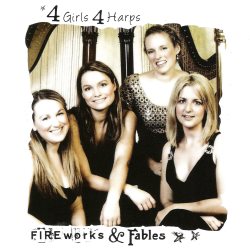| 
|
Fireworks and Fables - original works, arrangements and transcriptions for four harps
Harriet ADIE (b.1980)
Sun, Moon and Stars - a Middle Eastern Sky (2004) [6.51]
Ernesto LECUONA (1895-1963)
Malagueña (1928) [4.24]
Camille SAINT-SAËNS (1835-1921)
Carnaval des Animaux (excerpts) (1886) [8.25] (Volière [1.27]; L’Éléphant [2.01]; Aquarium [2.01]; Le Cygne [2.56])
Maurice RAVEL (1875-1937)
Ma Mère l’Oye (excerpts) (1908-1912) [9.56] (Pavane [1.50]; Laideronette [3.46]; Les entretiens de la Belle et de la Bête [4.20]
Eleanor TURNER (b.1982)
Rambla! (2007) [7.17]
George Frideric HANDEL (1685-1759)
Royal Fireworks and Water Music (excerpts) (1715) [7.49] (La Réjouissance [3.15]; Hornpipe [1.27]; Alla Hornpipe [3.07])
Edward LONGSTAFF (b.1965)
Saraswati (2002) [14.14]
4 Girls 4 Harps (Keziah Thomas (harp); Angharad Wyn Jones (harp); Harriet Adie (harp); Eleanor Turner (harp))
George Gershwin (1898-1937) Summertime from ‘Porgy and Bess’ (1935) [3.19]
rec. 13 and 14 August 2008 at Christ Church, Southgate, London, UK
ARTS IN FUSION AIF06 [59:08]
The harp’s image has had a somewhat bumpy ride over the years, whether portrayed as the instrument of angels or entrusted to the hands of the on-screen comic Harpo Marx. It will be recalled that Harpo once destroyed a grand piano playing the Prelude in C# minor by 'Wreckmaninov' in the film ‘Day at the Races’, removed its inner pedal-less frame and played what was effectively a harp. Harpo was a fine self-taught, right-shouldered harpist.
The harp adds a lushness to the texture and colours of an orchestra’s sound but in recent years its own achievable effects and variety of sounds and timbres have been broadened considerably. Paul Patterson’s ‘Armistice’ Op.108 is such a work. If the harp is associated with the playing of an angel, one can only marvel at the prospect of hearing four of them, perhaps Paradise itself on earth. The quartet of 4 Girls 4 Harps has a healthy diary of performances around the UK which testifies to its success and popularity. The original quartet — there has been at least one change — was formed in 2000 while they were pupils of Daphne Boden at the Royal College of Music. They have built up a repertoire of arrangements and transcriptions for four instruments as well as commissioning new works or composing them themselves.
The present disc ‘takes you on a journey across the globe, visiting countries as far afield as India, Spain and the Middle East’. Harriet Adie’s evocation of her own childhood in Oman from calls to prayer, sun-baked market places, silent, dark cloudless nights perfect for stargazing makes an impressive start. Her music and harmonic language capture the style in an attractive through-composed three-movement structure. Immediately noticeable is the variety of density achieved by using one or all of four harps playing different figurations and mixing harmonics. The final moments of this accomplished work - Sun, Moon and Stars - are beautifully played as night drifts into a new dawn. The Cuban composer Ernesto Lecuona is best remembered for his piano piece Malagueña, a work which sounds familiar but cannot be placed; not helped here by its omission from the CD booklet notes. It forms the sixth movement of his Suite Andalucia. A Malagueña, which could be a woman from Malaga, is a Spanish song. It features in Ravel’s Rapsodie espagnol, as the second movement of Shostakovich’s Symphony No.14 and in Albeniz’s España. Identifiable features consist of repeated harmonic and rhythmic patterns in the phrases and accelerating passages which build to the climaxes. The arrangement here is by the renowned American harpist, Arabella Sparnon (1914-2012) and its performers duly rise to its virtuosic challenges.
From more established repertoire come the two standard French works by Saint-Saëns and Ravel from which movements are taken. Harriet Adie and Eleanor Turner transcribe them skilfully, the birds in the aviary and fishes in the sea flash past in continually darting flourishes, the elephant duly lumbers and the brief carnival ends with a warm account of the famous swan, even if the arrangement by the Czech-born American harpist and teacher Kajetan Attl (1889-1976) does not quite capture the lustre of the cello. The Ravel transcriptions — made once again by the talented Ms Adie — sit more comfortably in the composer’s impressionist style, Laideronette in particular has some (literally) striking effects, while the conversations between Beauty and the Beast receive the contrast we heard in Saint-Saëns’ birds and the elephant. Eleanor Turner’s own Rambla! has echoes of flamenco rhythms and an ensemble of guitars. Inspired during a visit to Spain, the Rambla is a dry river bed which every two years or so erupts in a flash flood. This is beautifully crafted music which builds to an exciting conclusion. Ms Turner’s transcriptions of Handel’s music may work on paper but are rather too blurred in performance, losing their clean-cut lines in a wash of sound. Nevertheless the familiar hornpipe from the Water Music will be enjoyed.
British composer Edward Longstaff was commissioned to write Saraswati — the Hindu goddess of knowledge — for the quartet to which is added the tabla player Sanju Sahai. The work consists of two Invocations and the style is minimalist while following the precepts of Indian classical music. This is a fascinating work and holds the listener from start to finish; it receives an accomplished, well-paced and thrilling account.
To conclude this highly enjoyable disc, Harriet Adie has made a beautifully sensitive transcription of Gershwin’s evergreen Summertime with the clever addition of drums (Chris Marshall) and double bass (Matt Ridley). It’s a ‘must hear’ last thing at night before drifting off to sleep.
Christopher Fifield
 |
 |
|











